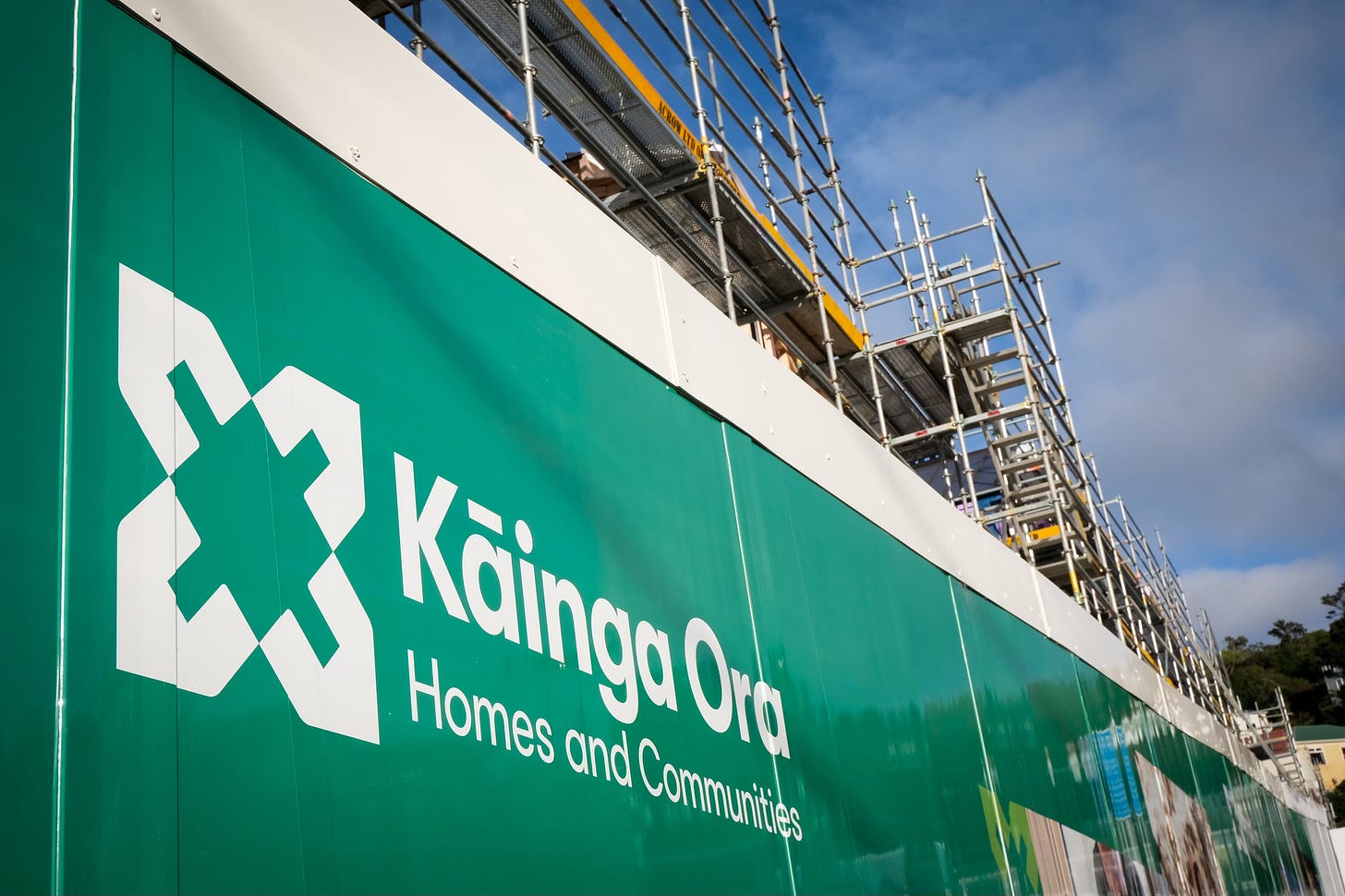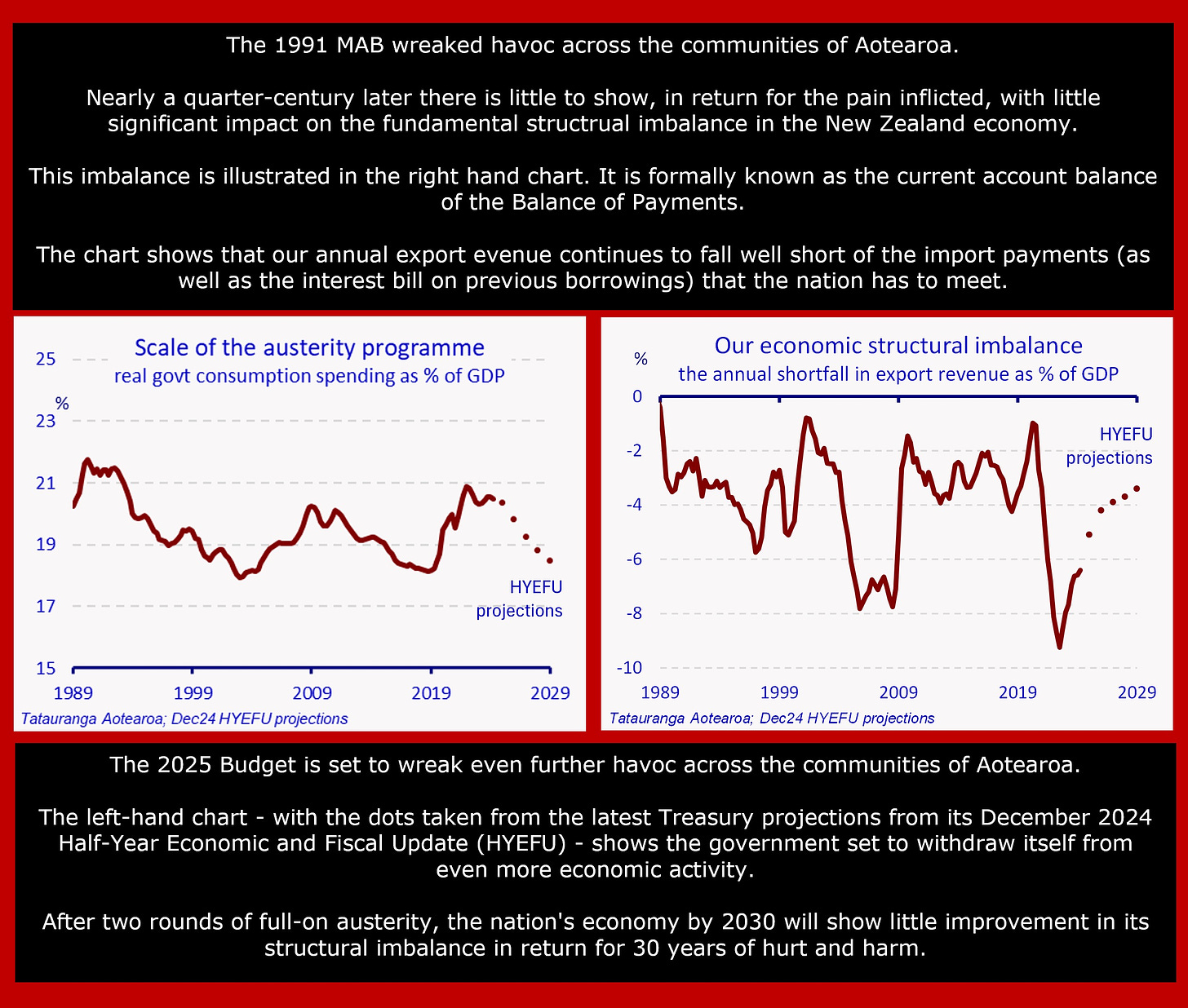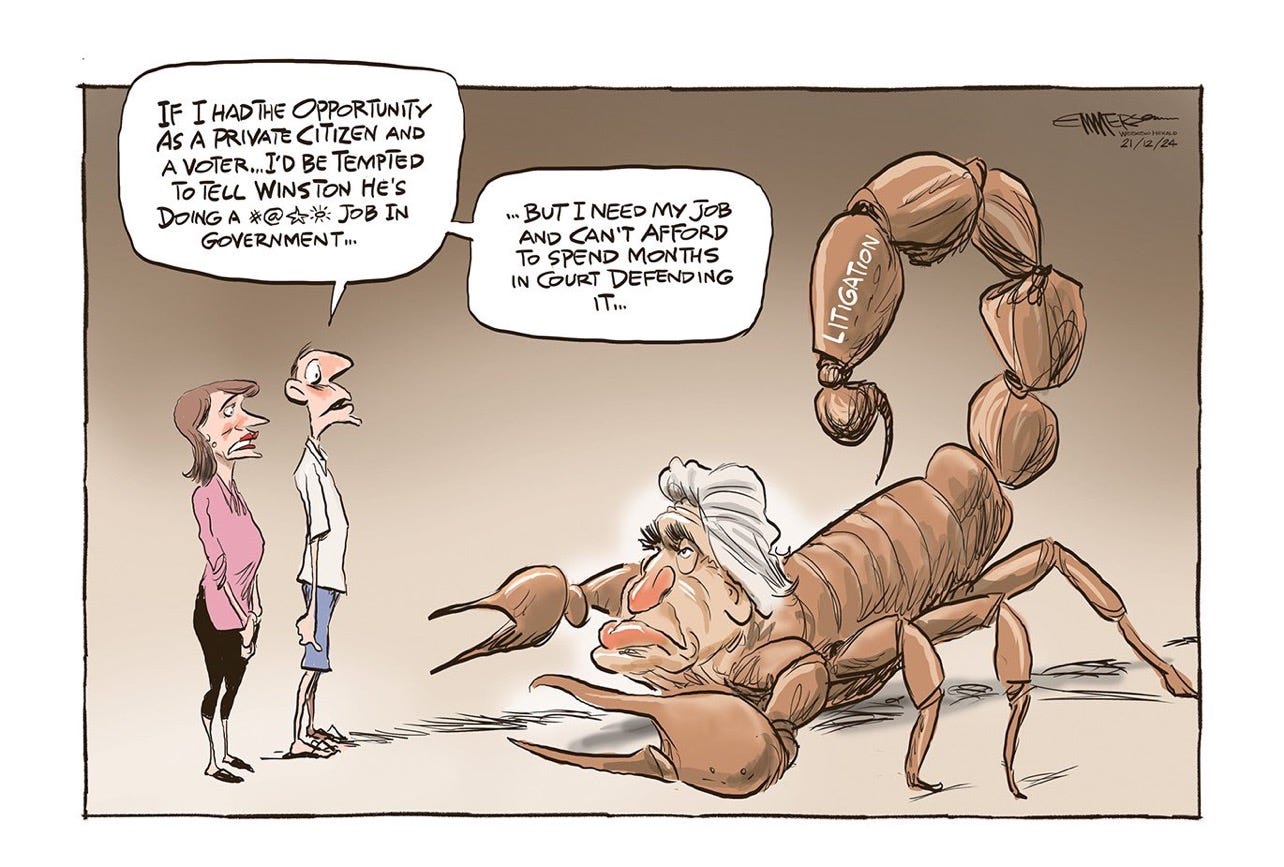
Mōrena. Long stories short, the six things that mattered in Aotearoa’s political economy around housing, climate and poverty in the week to Saturday, December 21 (Gravy Day1) are:
Nicola Willis pledged this week to cut public spending even harder to reduce public indebtedness after learning the first year of austerity had already helped cause New Zealand’s worst recession since Ruth Richardson’s Mother of All Budgets in 1991, and was making it even harder to reduce debt/GDP because the strategy to cut debt to GDP was increasing debt and reducing GDP;
Simeon Brown and Christopher Luxon doubled down on blaming councils for reckless spending on pet projects for double-digit rate increases, even though councils rightly accuse the Government itself of causing the rates increases by cutting capital grants;
This week’s recession news and the Treasury’s massive downgrading of its productivity forecasts reinforced the current Government’s lack of a strategy to pivot to productivity;
The OECD and IMF have repeatedly advised New Zealand Governments of both flavours that a pivot to productivity would need to see capital and wealth taxed in ways similar to other countries (as opposed to not at all) and for an economic and legal restructuring to massively increase competition;
MSD reported this week it is now rejecting around 220 pleas each day for emergency food grants to save money, just as food banks reported surges in demand and funding cuts by the Government. Meanwhile, about 220 workers are emigrating each day because low wages aren’t enough to cover high rents, electricity bills and food bills; and,
Despite its self-professed ‘Going for Housing Growth’ strategy, we learned this week the Government has blocked Kāinga Ora was developing land near Tauranga for over 30,000 houses and has reversed plans to build over 1,000 new homes next year, event though they are consented and land is available. Meanwhile, I understand Kāinga Ora has decided to dissolve its LEAD Alliance partnership with private builders, engineers and lawyers in Auckland that was designed to build up to $200 million worth of homes each year.
(Normally there’s more in the podcast above and in the detail below the paywall for paying subscribers only, including the daily Pick ‘n’ Mix Six, Chart du Jour, Quote du Jour, Cartoon du Jour, and a Timeline-Cleansing nature pic. But on this last day of the ‘Gravy Day Fortnight’, we have opened everything up to give everyone a taste of the public interest journalism paying subscribers support. Here’s the introductory ‘Gravy Day’ deal ending midnight tonight of 50% for a year for new subscribers, which equals $9.50/month and $95/year. The subscription price reverts to the full price after a year, unless you stop automatic renewal. All prices include GST.
We also have year-round subscription deals for particular people who would like to contribute and be full subscribers, but can’t quite afford the normal $19/month or $190/year. The deals are:
for people under 30 ($3/month or $30/year) here;
for pensioners who rent ($6.50/month or $65/year here); and,
Totally free for students and teachers and staff of schools, universities and polytechs who register for the free version with their .ac.nz or .school.nz email addresses. We automatically upgrade you in the backend. If you’ve been missed, yet flick us a message.
‘The floggings will continue until morale improves’
The Government ploughed ahead with an even more aggressive austerity programme this week after being told its own spending cuts this year and high interest rates had created the deepest recession since the 1991 Mother of All Budgets, which PM Christopher Luxon has referred to as the lesson we needed to relearn from 35 years ago of ‘tightening our belt’ and ‘living within our means’.
The results this week of that austerity programme included:
the cancellation of a pilot that allowed Māori and Pacific people to access bowel cancer screening starting from the age of 50;
the collapse of obstetric services at Whakatāne hospital;
the sacking of over 1,000 IT workers that hospital staff have warned will lead to deaths;
the cutting of funds for food banks and tougher criteria for emergency food grants from MSD;
the cancellation of over 1,000 new house builds by Kāinga Ora next year; and,
the cutting of funding for a successful immunisation programme for Māori and Pacifica, just as doctors warned of a whooping cough epidemic.
“Who's the first one they cut? Us. They're cutting back on all of these things to do with Māori development or Pasifika… so I'm not at all surprised. It's just going to be: keep cutting.” Tilly Turner, a Māori ward councillor, on news of the cancellation of the bowel cancer test trial.
See more details here:
Govt ends bowel cancer screening programme for Māori and Pacific RNZ
'There will be deaths because of this' - warning over Health NZ IT cuts RNZ
Coalition blames councils for rate hikes it caused
The National-ACT-NZ First Coalition Government announced this week a new set of reports on council financial performance and suggested capping rates increases, accusing councils of reckless spending on ‘pet projects’ and blaming councils for double-digit rate increases this year.
Mayors and councillors hit back, accusing the Government of cutting capital grants and increasing fees for water, roading, bus and cycling infrastructure. The problem for the Government, and by extension its own ambitions to ramp up infrastructure spending to build more houses, is it needs the active cooperation and spending of councils.
“The Government just said they want us to keep rates low, yet they’re forcing a rates increase,” Christchurch City Councillor Jani Johanson via The Press
Where’s the strategy to revive productivity?
New Zealand’s GDP per capita suffered its worst recession since the 1991 recession in the June and September quarters, thanks in large part to interest rates being higher and for longer than in other countries and the Government arresting the development of new houses, schools, local roads and hospitals in the March quarter and unleashed 10,000 job cuts in the public service.
Treasury also reported this week it had lowered its productivity forecasts for years to come, which was reflected in its downgrading of its forecast size of the economy out to 2029, a reduction in taxes and a $20 billion increase in the Government’s borrowing requirements.
Yet there is no suggestion from the Government of it adopting any of the recommendations of the likes of the Productivity Commission (which it dismanted), the OECD, the IMF and countless tax working groups and official inquiries that New Zealand’s Government needs:
to change incentives for savings and investment in more business equipment and IP, infrastructure, training and R&D, both public and private, and less savings and leveraged investment in residential land; and,
to improve competition across major sectors of our economy that are currently dominated by quadropolies (banking and electricity), duopolies (supermarkets and building materials) and monopolies (airlines and insurance).
The policy changes that actually address productivity
That pivot to productivity would involve policy changes by the Government to:
tax residential land values, wealth in assets, deceased estates and income from capital gains in some form, as is done in other countries;
incentivise household savings and investment in pension funds, as is done in other countries; and,
aggressively increase public investment in infrastructure such as public transport, health, education and housing, to trigger private investment that often piggybacks on top of new public transport, new housing, new hospitals and new schools.
The current Government has rejected all these policies and has pledged instead to reduce the size of Government from over 34% of GDP to 30%, while also reducing public debt from over 40% of GDP to closer to 30%. The theory is that will reduce inflation and encourage households and businesses to step forward to take on more debt to invest and spend in the areas of the economy where the Government steps back.
The problem is the strategy has been tested many times over the last 30 years and the results have been studied by the IMF, World Bank and OECD. Repeatedly, they have advised against austerity, especially in a recession and especially to fund tax cuts for the wealthiest, given that cash is often saved in bank accounts, rather than spent or invest, or is used for yet-more leveraged investment in residential land for tax-free income from capital gains.
No wonder workers are bailing out of the austerity economy
This week it was reported MSD is now rejecting around 220 pleas for emergency food grants each week because it has toughened its criteria and processes for approvals to save just over $20 million a year.
Coincidentally, perhaps, that 220 rejections is the same number of New Zealand residents emigrating permanently each day.
New Zealander Poreva Kirikava moved with his family of five to Sydney a week ago. He paid A$380 for his first grocery shop, where he told the Daily Mail Australia the same shopping trip would have cost NZ$1,000. His case emerged after he sent out a TikTok saying how he felt after realising the difference in living costs between Australia and New Zealand. Here’s what he said:
“After we did the food shopping, I'm bawling my eyes out because in New Zealand, there were moments where we thought we weren't going to eat.”
‘Reflecting on one occasion, he remembered one of his kids looking for snacks in the pantry cupboard, only to find nothing.
“'He'd say, "Daddy, there's nothing to eat... There's no snacks". And I would go angry. Today, I realised I wasn't angry because he was hungry or there were no snacks, it was because I felt that I wasn't able to provide.” Poreva Kirikava via TikTok
When ‘going for growth’ means stopping new builds
This week we learned the Government had blocked a plan being led by Kāinga Ora in Tauranga to develop enough greenfields land for over 30,000 houses to be built over the next 20 years.
We also learned the Government had cancelled 60% of Kāinga Ora’s new builds next year, or over 1,000 new homes, even though the land for them was already bought, the consents were consented and there are builders unemployed all over the place.
I’m also reliably informed from sources in and around Kāinga Ora that it decided this week to shut down its LEAD Alliance that designs and delivers large-scale housing projects in Auckland. It was created by Kāinga Ora in 2018 with construction firms Dempsey Wood, Hick Bros Group, engineers Tonkin + Taylor and Woods, and law firm Harrison Grierson to build $200 million worth of homes each year.
This memo was sent internally to staff this week from a senior executive notifying that “we have made the decision to close down LEAD Alliance,” adding:
Due to the programme of work reducing, and project delivery timeframes moving out, there have been increases to costs that have reduced the value of an alliance delivery model.
We know that there has been a lot of work in recent years (and particularly around the reset and contract extension process in 2023) to lift the performance of the alliance. This work has been successful and the alliance is now running very well with consistent and predictable programme, costs to complete, communications and interface with Kāinga Ora.
However, we have determined that LEAD Alliance will not be able to deliver the flexibility and cost efficiencies we require in our current operating context and no longer suits our needs.
Kāinga Ora, as the Owner-Participant, will supply formal notice to the alliance on Friday 31 January, and that notice will also include confirmation of the work packages that will proceed in the existing alliance model, and those that will either pause or change. Kainga Ora internal memo.
The memo went on to say Kāinga Ora would finish existing projects over the next two years.
The Top Six in the Pick ‘n’ Mixes for Saturday, December 21
Health & Te Ao Māori Govt ends bowel cancer screening programme for Māori and Pacific RNZ’s Mary Afemata
Health & austerity Obstetrics cuts ‘devastating’, mayors say RNZ’s Diane McCarthy
Health & austerity 'There will be deaths because of this' - warning over Health NZ IT cuts Lee Scanlon for Westport’s The News via RNZ
Education & privatisation: Polytechs could go up for sale when Te Pūkenga is disestablishedRNZ’s John Gerritsen
Feature by Charlie Mitchell in The Weekend Press-$: The agricultural lobbying that preceded Government freshwater intervention. Hundreds of pages of emails show the extent of farming groups lobbying for freshwater changes - in some cases followed by Government action.
Column by Janet Wilson in The Weekend Post-$ Year 1 of the coalition: struggling economy and a stumbling PM. He enters his second year as Prime Minister as the weakest leader in the coalition, a nowhere man who stands for nothing and falls for everything.
The Best of the Rest: Pick ‘n’ Mixes for Sat, Dec 20
I’m now publishing this on Substack only to avoid cluttering these emails up with too many links, which seem to be triggering a few spam filters, which is death to a newsletter writer. Just click through to the full list here:
Quote du Jour: ‘Just drive from Ruatoria to Tauranga’
“There's a risk issue. If it turns out your pregnancy is not working out well and you have to get in an ambulance and head to Tauranga, that's problematic. I'm not quite sure if this is a temporary thing or if there's a hidden agenda to cut services.” Whakatāne Mayor Dr Victor Luca via RNZ on the collapse of obstetrics services at Whakatāne hospital this week.
Chart du Jour: The MAB (Mother of All Budgets)

Cartoon du Jour: A political scorpion

Timeline-cleansing nature pic: ‘I’m off to the beach’

Mā te wā. Bernard
PS: This is the last Saturday Soliloquy for 2024. I’ll be restarting publishing of Dawn Choruses and the occasional Saturday Soliloquy from January 13.
Here’s where Gravy Day comes from:













Share this post